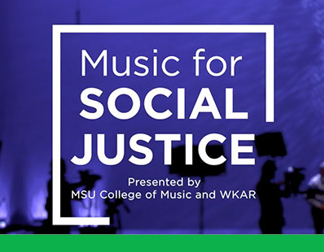
Overview
Michigan State University is committed to reflecting the rich diversity of its students and alumni in university experiences, initiatives, communications and interactions. The MSU Alumni Office (MSUAO) seeks to bring awareness to the university community’s diversity efforts by featuring content and stories supporting these communities.
Content will be changed out frequently, so you are encouraged to visit this page regularly. For more information about our content schedule or the MSUA diversity, equity and inclusion workgroup, view our commitments and goals.

MSU Releases Diversity, Equity and Inclusion Plan
After several months of work, MSU's Diversity, Equity and Inclusion (DEI) Steering Committee has released its DEI Plan for the university.
The Power of the Great Outdoors
Erica Zazo, ’14, is a freelance outdoor travel writer based in Chicago with a passion for nature and the impact it can have on society.
As a proud journalism graduate from the College of Communication Arts and Sciences, Zazo, knows the positive impact nature has on society. She credits her MSU experience, time spent with the MSU Outdoors Club and involvement with the Student Conservation Association, with helping her discover her passion for the outdoors, traveling and writing.


A Path for Advancing Equity with Dr. Jabbar Bennett
Spartan alumni and friends gathered on April 20, 2022 at the National Center for Civil and Human Rights in Atlanta for a meaningful conversation about MSU’s vision for strengthening community and supporting the success of every Spartan, led by Jabbar R. Bennett, Ph.D., vice president and chief diversity officer at Michigan State University. Atlanta TV news broadcaster and alumna Aisha Howard moderated the program. Spartans Ingrid Saunders Jones and Ed Potter serve on the board of the center.
WKAR, College of Music Debut "Music for Social Justice" Series
WKAR Public Media and the College of Music at Michigan State University announced May 2 the upcoming broadcast premiere of "Music for Social Justice," a new television series exploring societal issues through music and the personal stories of the artists behind the music. The series debuts May 8 on WKAR-TV 23, the PBS station serving Michigan's capital region.
Episodes will air on WKAR HD 23.1 at 4 p.m. on Sundays with repeats at 1:30 p.m. on Thursdays beginning May 8 and continuing through June 23. Each episode will be available streaming in the free PBS Video app and at video.wkar.org beginning on its broadcast premiere date.
"Music for Social Justice" features artists as they relate the music they play to societal issues and their own lived experiences. Issues explored range from racism, policing, and internment camps, to the murders of trans women. Powerful and emotive, the series takes an expansive view of what social justice means.

Alumna Ensures Magazine Stays Culturally Relevant
Pop culture energizes and fascinates Geneva S. Thomas. It sparks her imagination and makes her a leader who shapes the way pop culture is talked about, written about and explored on social media.
Thomas has shaped the digital strategies of such brands as InStyle, Food & Wine, W Magazine and Architectural Digest. In 2020, she was named general manager at Meredith Corporation, the publisher of Entertainment Weekly and People en Espanol.


Endea Owens, '15, Believes in the Power of Community, Connection and Music
After graduating from the Michigan State College of Music in 2015, Endea Owens went off to New York and The Juiliard School—where her career caught fire. She was named among the 2019 class of emerging artists by the Lincoln Center for the Performing Arts, and today is a member of Stay Human, the house band for The Late Show With Stephen Colbert. She founded the Community Cookout in 2020, where she provides free meals and a free concert for communities throughout New York. The Community Cookout strives to make New York a better place through music, activism, and meals.
She joined MSU at Minton’s Playhouse in Harlem in the spring of 2022 to share her story.
Support MSU's Efforts
Student Veterans Resource Center
Here at MSU, we are committed to veteran success. The Student Veterans Resource Center (SVRC) exists to help military veterans and their families achieve academic and personal success. The SVRC is staffed by military veterans and dependents with a strong passion for helping our students.
Malawi Project
The Blantyre Malaria Project (BMP), one of four research affiliates embedded in the Kamuzu University of Health Sciences (KUHeS, formerly known as the University of Malawi College of Medicine), was established by Michigan State University’s Dr. Terrie Taylor and Professor Malcolm Molyneux of the Liverpool School of Tropical Medicine in 1986. Each year between January and early May, the International Health Elective Clerkship provides an opportunity for 24 MSU students (three groups of eight) from the Colleges of Osteopathic and Human Medicine to spend six weeks working at Queen Elizabeth Central Hospital practicing medicine in a resource-poor setting under the supervision of Dr. Taylor.
Content Suggestions and Feedback
Conversations around diversity, equity and inclusion are essential and constantly evolving.
If you have feedback or a topic suggestion, please email Maria Giggy.
